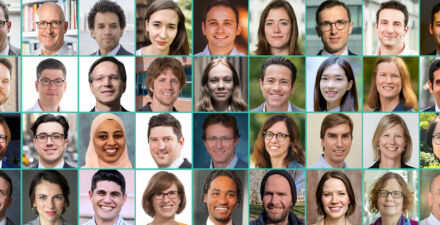Early career scholars to receive Equitable Growth funding to study economic inequality

The Washington Center for Equitable Growth today announced a new slate of grantees. These 10 scholars responded to a Request for Proposals specifically targeted at those early in their careers whose research is policy-relevant and can inform how policymakers can take action to create more stable, broadly shared U.S. economic growth.
Equitable Growth is committed to funding the next generation of scholars and supporting them to ensure the research they produce informs evidence-backed policymaking. We are also committed to supporting diversity across the social sciences—especially in economics, which lags other disciplines in gender, racial, and ethnic diversity. All researchers affiliated with a U.S. university whose Ph.D. was issued within the past 8 years, as well as current graduate students in the dissertation stage of a Ph.D. program at a U.S. university, were eligible to apply.
“These scholars represent a new generation of researchers looking into why inequality continues to be a drag on the U.S. economy and how we might combat it,” said Equitable Growth President and CEO Shayna Strom. “We are proud to help make their research accessible to all and support them as they produce evidence-backed ideas that will shape economic policies for years to come.”
The Request for Proposals was split into an array of issue areas: macroeconomic growth, fiscal policy, human capital and well-being, economic mobility, the labor market, and market structure. Equitable Growth was particularly interested in funding research that will generate actionable insights, illuminate policies that help or hinder equitable economic growth, or uncover a need for policy action. Applicants who will create new data that can be made publicly available were prioritized, as were those who engage with the literature across disciplines and those examining the role of racial stratification in the issue they seek to study.
Below, we detail the pre-tenure academics, who will each receive $30,000 from Equitable Growth, and their proposed research.
- Arizona State University’s Samuel Young will estimate which individuals benefit when firms become more productive and whether these same individuals bear the costs when firms perform poorly. Looking specifically at so called pass-through businesses, he will identify each firm’s workers and owners and measure their total compensation from theses firms, and then will estimate the distributional effects of productivity changes.
- Elena Prager of the University of Rochester will study how firms collude in labor markets, and specifically how common leadership and no-poach agreements can play a role. Even though common leadership (when the same person holds high-level positions at two competing firms) is prohibited by antitrust law, it is rarely enforced, and no-poach agreements are difficult to study because they are typically secret. Prager will use court records from the late 2000s, when 50 tech companies entered into no-poach agreements, to see whether these agreements affect worker mobility and career trajectories.
- Jessica Brown of the University of South Carolina will examine the impact of private-equity-owned child care businesses on the market for early care and education. She will determine how these child care centers differ from others, how a child care center changes when it is taken over by a private equity firm, and how entry of a private-equity-owned center affects other child care providers in the area.
- American University’s Jhacova Williams will study the housing consequences of Interstate 10 in New Orleans, and specifically whether the highway’s construction resulted in differential housing outcomes in Black vs. White neighborhoods. Williams has created a unique dataset from the U.S. Geological Survey, National Historical Geographic Information System, and other census tract data.
The following Ph.D. students (some of whom have completed their doctorate since applying to the RFP and are in early-career positions at U.S. universities) will receive $15,000 from Equitable Growth to advance their research:
- The University of Kentucky’s Eleanor Krause (formerly studying at Harvard University) will research which labor market frictions prevent workers and communities from adjusting to local employment shocks and the extent to which investments in human capital address these frictions. Specifically, she will look at the transition to a clean energy economy in coal industry communities.
- The University of Maryland’s Jordan Richmond (formerly studying at Princeton University) aims to better understand the distributional consequences of the tax subsidy for private equity. Using administrative tax data, he will quantify the preferential tax treatment of private equity profits, compare private equity income and tax losses with counterfactual tax liabilities, and examine the consequences for workers across the income distribution.
- Stanford University’s Brendan Moore will examine barriers to accessing Unemployment Insurance. He will look at the underlying causes of incomplete UI take-up and the barriers that disproportionately target low-income and marginalized workers and reinforce inequity in the UI program. Then, Moore will determine ways that outreach can boost UI take-up, improving outcomes for workers and reducing inequities.
- Kassandra Hernandez of the University of California, Berkeley will explore how worker-led lawsuits impact firm size, survival, relocation decisions, employment, and wages. She will use publicly available data on lawsuits filed under California’s Private Attorneys General Act and settlements from California’s Department of Industrial Relations to determine whether the law is an effective tool to support worker rights.
- Cornell University’s Neil Cholli will investigate the incidence and consequences of families participating in multiple income support programs, such as the Supplemental Nutrition Assistance Program, Medicaid, and other government assistance programs. His project will produce descriptive statistics on how frequent multiple-program participation is, estimate the causal effects on family well-being, earnings, and outcomes for adults and children, and evaluate the efficacy of participating in multiple programs, as well as which combinations of programs have the largest effects on economic well-being.
- Micah Villarreal of the University of California, Santa Barbara will examine the effect of wealth on descendants of enslaved Americans in Oklahoma after federal American Indian policy made many of these “freedmen” landowners. Using the wealth shock produced by a subsequent oil boom, Villarreal seeks to explore the short- and long-term effects on Black households of this influx of wealth—with potential policy implications for reparations and racial wealth inequality.
This Request for Proposals helps Equitable Growth work toward its longstanding goal of supporting early career scholars from diverse backgrounds and in varying stages of their academic careers. The competitive process includes a review by our esteemed review committees, made up of staff and external subject-matter and methodological experts, as well as final approval from our Steering Committee.
We thank all who applied for this year’s Early Career Request for Proposals for their hard work and heartily congratulate the 2024 cohort of early career grantees. We look forward to reviewing their findings and related studies in the future.
Did you find this content informative and engaging?
Get updates and stay in tune with U.S. economic inequality and growth!



